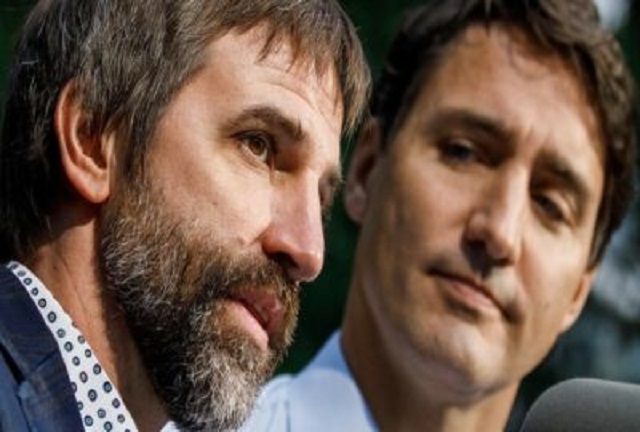Economy
Ottawa’s new ‘climate disclosures’ another investment killer

From the Fraser Institute
By Matthew Lau
The Trudeau government has demonstrated consistently that its policies—including higher capital gains taxes and a hostile regulatory environment—are entirely at odds with what investors want to see. Corporate head offices are fleeing Canada and business investment has declined significantly since the Trudeau Liberals came to power.
According to the Trudeau government’s emissions reduction plan, “putting a price on pollution is widely recognized as the most efficient means to reduce greenhouse gas emissions.” Fair enough, but a reasonable person might wonder why the same politicians who insist a price mechanism (i.e. carbon tax) is the most efficient policy recently announced relatively inefficient measures such “sustainable investment guidelines” and “mandatory climate disclosures” for large private companies.
The government claims that imposing mandatory climate disclosures will “attract more private capital into Canada’s largest corporations and ensure Canadian businesses can continue to effectively compete as the world races towards net-zero.” That is nonsense. How would politicians Ottawa know better than business owners about how their businesses should attract capital? If making climate disclosures were a good way to help businesses attract capital, the businesses that want to attract capital would make such disclosures voluntarily. There would be no need for a government mandate.
The government has not yet launched the regulatory process for the climate disclosures, so we don’t know exactly how onerous it will be, but one thing is for sure—the disclosures will be expensive and unnecessary, imposing useless costs onto businesses and investors without any measurable benefit, further discouraging investment in Canada. Again, if the disclosures were useful and worthwhile to investors, businesses seeking to attract investment would make them voluntarily.
Even the government’s own announcement casts doubt that increasing business investment is the likely outcome of mandatory climate disclosures. While the government says it’s “sending a clear signal to corporate boards and shareholders, at home and around the world, that Canada is their trusted partner for putting private capital to work in the race to net-zero,” most investors are not looking to put private capital to work to combat climate change. Most investors want to put their capital to work to earn a good financial return, after adjusting for the risk of the investment.
This latest announcement should come as no surprise. The Trudeau government has demonstrated consistently that its policies—including higher capital gains taxes and a hostile regulatory environment—are entirely at odds with what investors want to see. Corporate head offices are fleeing Canada and business investment has declined significantly since the Trudeau Liberals came to power. Capital per worker in Canada is declining due to weak business investment since 2015, and new capital per-Canadian worker in 2024 is barely half of what it is in the United States.
It’s also fair to ask, in the face of these onerous polices—where are the environmental benefits? The government says its climate disclosures are needed for Canada to progress to net-zero emissions and “uphold the Paris climate target of limiting global warming to 1.5°C above pre-industrial levels,” but its net-zero targets are neither feasible nor realistic and the economics literature does not support the 1.5 degrees target.
Finally, when announcing the new climate disclosures, Trudeau Environment Minister Steven Guilbeault said they are an important stepping stone to a cleaner economy, which is a “major economic opportunity.” Yet even the Canada Energy Regulator (a federal agency) projects net-zero policies would reduce real GDP per capita, increase inflation of consumer prices and reduce residential space (in other words, reduce living standards).
A major economic opportunity that will increase business investment? Surely not—mandatory climate disclosures will only further reduce our standard of living and impose useless costs onto business and investors, with the sure effect of reducing investment.
Author:
Bjorn Lomborg
The stupidity of Net Zero | Bjorn Lomborg on how climate alarmism leads to economic crisis

From spiked on YouTube
Note: This interview is focused on Europe and the UK. It very much applies to Canada. The 2025 Federal Election which will see Canadians choose between a more common sense approach, and spending the next 4 years continuing down the path of pursuing “The Stupidity of Net Zero”.
European industry is in freefall, and Net Zero is to blame.
Here, climate economist Bjorn Lomborg – author of Best Things First and False Alarm – explains how panic over climate change is doing far more damage than climate change itself. Swapping cheap and dependable fossil fuels for unreliable and expensive renewables costs our economies trillions, but for little environmental gain, Lomborg says.
Plus, he tackles the myth of the ‘climate apocalypse’ and explains why there are more polar bears than ever.
Support spiked: https://www.spiked-online.com/support/
Sign up to spiked’s newsletters: https://www.spiked-online.com/newslet…
Business
Scott Bessent Says Trump’s Goal Was Always To Get Trading Partners To Table After Major Pause Announcement


From the Daily Caller News Foundation
By
Secretary of the Treasury Scott Bessent told reporters Wednesday that President Donald Trump’s goal was to have major trading partners agree to negotiate after Trump announced a 90-day pause on reciprocal tariffs for many countries after dozens reached out to the administration.
Trump announced the pause via a Wednesday post on Truth Social that also announced substantial increases in tariffs on Chinese exports to the United States, saying 75 countries had asked to talk. Bessent said during a press event held alongside White House press secretary Karoline Leavitt that Trump had obtained “maximum leverage” to get trading partners to negotiate with the April 2 announcement of reciprocal tariffs.
“This was his strategy all along,” Bessent told reporters during an impromptu press conference at the White House. “And that, you know, you might even say that he goaded China into a bad position. They, they responded. They have shown themselves to the world to be the bad actors. And, and we are willing to cooperate with our allies and with our trading partners who did not retaliate. It wasn’t a hard message: Don’t retaliate, things will turn out well.”
Dear Readers:
As a nonprofit, we are dependent on the generosity of our readers.
Please consider making a small donation of any amount here.
Thank you!
WATCH:
China imposed retaliatory tariffs on American exports to the communist country Wednesday, imposing an 84% tariff on U.S. goods after Trump responded to a 34% tariff by taking American tariffs to 104%.
“Based on the lack of respect that China has shown to the World’s Markets, I am hereby raising the Tariff charged to China by the United States of America to 125%, effective immediately,” Trump said. “At some point, hopefully in the near future, China will realize that the days of ripping off the U.S.A., and other Countries, is no longer sustainable or acceptable.”
“They kept escalating and escalating, and now they have 125% tariffs that will be effective immediately,” Bessent said during the press conference.
Bessent said that China’s actions would not harm the United States as much as it would their own economy.
“We will see what China does,” Bessent said. “But what I am certain of, what I’m certain of, is that what China is doing will affect their economy much more than it will ours, because they have an export-driven, flood the world with cheap export model, and the rest of the world now understands.”
The Dow Jones Industrial average closed up 2,962.86 points Wednesday, with the NASDAQ climbing by 1,755.84 points and the S&P 500 rising 446.05 points, according to FoxBusiness.
-

 Also Interesting2 days ago
Also Interesting2 days agoMortgage Mayhem: How Rising Interest Rates Are Squeezing Alberta Homeowners
-

 2025 Federal Election2 days ago
2025 Federal Election2 days agoConservative Party urges investigation into Carney plan to spend $1 billion on heat pumps
-

 Also Interesting2 days ago
Also Interesting2 days agoExploring Wildrobin Technological Advancements in Live Dealer Games
-

 2025 Federal Election2 days ago
2025 Federal Election2 days agoCommunist China helped boost Mark Carney’s image on social media, election watchdog reports
-

 2025 Federal Election2 days ago
2025 Federal Election2 days agoFifty Shades of Mark Carney
-

 2025 Federal Election2 days ago
2025 Federal Election2 days agoCorporate Media Isn’t Reporting on Foreign Interference—It’s Covering for It
-

 Justice2 days ago
Justice2 days agoCanadian government sued for forcing women to share spaces with ‘transgender’ male prisoners
-

 Business1 day ago
Business1 day agoStocks soar after Trump suspends tariffs





